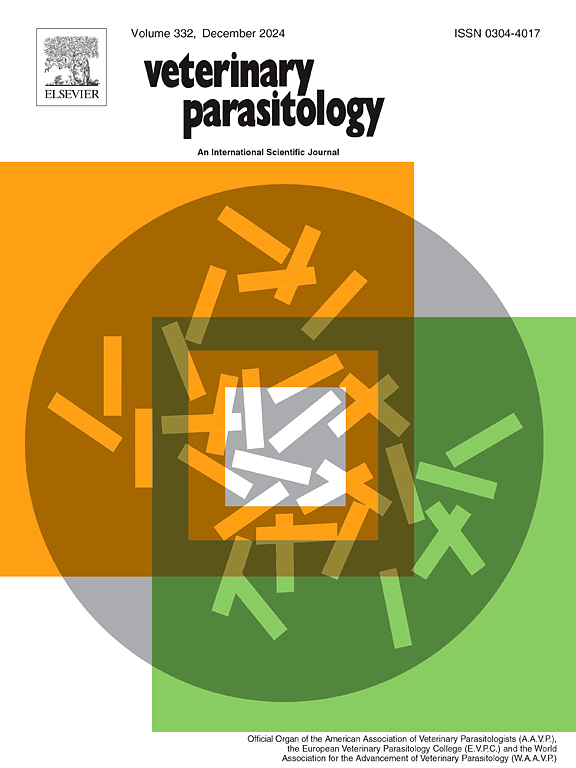Shifting Paradigms: Imidocarb dipropionate as an alternative chemotherapeutic strategy for Trypanosoma evansi infection in animals
IF 2.2
2区 农林科学
Q2 PARASITOLOGY
引用次数: 0
Abstract
We report on the in vitro and in vivo success of Imidocarb dipropionate (IDP), an aromatic diamidine compound, as an effective drug against Surra-causing organism, Trypanosoma evansi. IDP is a clinically acclaimed drug for the treatment of babesiosis and anaplasmosis. We have also investigated cytotoxic effect of IDP on equine Peripheral mononuclear cells (PBMCs) and Vero cell line. The data generated indicate that the IC50 of IDP (2.73 µM) was significantly lower than its cytotoxic concentration (32.66 and 80.70 µM against PBMCs and Vero cell line, respectively). We have recorded significant downregulation in mRNA expression of genes responsible for cellular regulatory activities such as cell division, glycolysis, nucleic acid synthesis, immune evasion strategy and redox homeostasis. During mice experimentation, dose of 20 mg/kg body weight was found to prolong the survival period of T. evansi infected mice by 20 days following two subsequent intra-peritoneal injections administered 72 h apart. Hematological, biochemical and histopathological investigations showed the effect of IDP on mice kidney and liver at four times multiples of the therapeutic dosage. Further, clinical trials on higher-order organisms are required before recommendation of IDP against T. evansi in the clinical host.
转变的范例:吡虫威二丙酸作为一种替代化疗策略,伊文氏锥虫感染的动物
本文报道了一种芳香二胺类化合物吡虫威二丙酸酯(IDP)在体外和体内的成功,作为一种有效的药物,用于治疗引起surra的生物体,埃氏锥虫。IDP是临床上广受好评的治疗巴贝斯虫病和无形体病的药物。我们还研究了IDP对马外周单核细胞(PBMCs)和Vero细胞系的细胞毒性作用。结果表明,IDP的IC50(2.73 µM)明显低于其对PBMCs和Vero细胞系的细胞毒浓度(分别为32.66和80.70 µM)。我们已经记录了负责细胞调控活动的基因mRNA表达的显著下调,如细胞分裂、糖酵解、核酸合成、免疫逃避策略和氧化还原稳态。在小鼠实验中发现,20 mg/kg体重的剂量可使感染伊文氏弓形虫的小鼠在两次腹腔注射后存活时间延长20天,每次注射间隔72 h。血液学、生化和组织病理学研究表明,IDP对小鼠肾脏和肝脏的影响是治疗剂量的4倍。此外,在推荐IDP对抗临床宿主中的伊氏弓形虫之前,需要对高阶生物体进行临床试验。
本文章由计算机程序翻译,如有差异,请以英文原文为准。
求助全文
约1分钟内获得全文
求助全文
来源期刊

Veterinary parasitology
农林科学-寄生虫学
CiteScore
5.30
自引率
7.70%
发文量
126
审稿时长
36 days
期刊介绍:
The journal Veterinary Parasitology has an open access mirror journal,Veterinary Parasitology: X, sharing the same aims and scope, editorial team, submission system and rigorous peer review.
This journal is concerned with those aspects of helminthology, protozoology and entomology which are of interest to animal health investigators, veterinary practitioners and others with a special interest in parasitology. Papers of the highest quality dealing with all aspects of disease prevention, pathology, treatment, epidemiology, and control of parasites in all domesticated animals, fall within the scope of the journal. Papers of geographically limited (local) interest which are not of interest to an international audience will not be accepted. Authors who submit papers based on local data will need to indicate why their paper is relevant to a broader readership.
Parasitological studies on laboratory animals fall within the scope of the journal only if they provide a reasonably close model of a disease of domestic animals. Additionally the journal will consider papers relating to wildlife species where they may act as disease reservoirs to domestic animals, or as a zoonotic reservoir. Case studies considered to be unique or of specific interest to the journal, will also be considered on occasions at the Editors'' discretion. Papers dealing exclusively with the taxonomy of parasites do not fall within the scope of the journal.
 求助内容:
求助内容: 应助结果提醒方式:
应助结果提醒方式:


